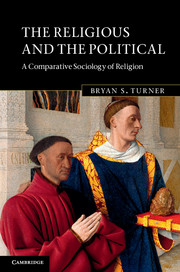Book contents
- Frontmatter
- Contents
- Acknowledgements
- Introduction
- Part I The religious and the political
- 1 Fear of diversity: the origin of politics
- 2 Charisma and church–state relations
- 3 City, nation and globe: the rise of the church and the citizen
- Part II State management of religion
- Part III Comparative and historical studies
- Part IV Conclusion
- References
- Index
1 - Fear of diversity: the origin of politics
Published online by Cambridge University Press: 05 April 2013
- Frontmatter
- Contents
- Acknowledgements
- Introduction
- Part I The religious and the political
- 1 Fear of diversity: the origin of politics
- 2 Charisma and church–state relations
- 3 City, nation and globe: the rise of the church and the citizen
- Part II State management of religion
- Part III Comparative and historical studies
- Part IV Conclusion
- References
- Index
Summary
Introduction: creating diversity
Much of the recent debate about religious conflicts, social diversity and the crisis of multiracial societies, especially in Western liberal states, presupposes a ‘fear of diversity’. In the subtitle to her book on religious intolerance Martha Nussbaum (2012) speaks of ‘the politics of fear in an anxious age’. Where does this come from? In the West diversity of peoples within the polis has been regarded as the cause of political theory, and we can read the classic account of democracy as a response to the perception of difference as the root of the political. Modern social and cultural diversity is bound up with the globalization of the labour market in the nineteenth and twentieth centuries, and the massive migration of Chinese people in and beyond Asia. Consequently, when one talks of migration, diaspora and diversity in Asia, one is mainly talking about the Chinese nineteenth-century migration that created Chinese minorities in the whole of Southeast Asia. These Asian societies were already highly diverse following their exposure to the outside world through trade routes. By contrast, multiculturalism in Europe arose in societies that were by comparison relatively homogeneous. For example, modern ethnic and religious diversity in the United Kingdom was created in the post-war period primarily by Commonwealth – and, more specifically, Caribbean – migration. In more recent times there has been a substantial Muslim migration from Bangladesh, Pakistan and India. In historical terms multiculturalism was probably invented by Prime Minister Trudeau to cope with nationalism in Quebec and the threat to Canadian federalism, but multiculturalism came to be a major plank of liberal Western politics facing diversity as an outcome of both legal and illegal migration. Of course white-settler societies such as Canada, America, Australia and New Zealand have, as it were, a double diversity – from indigenous peoples and from the migrant diaspora. When one speaks of the crisis of liberal multiculturalism, it is important to develop perspectives that take account of these different forms of diversity, and their somewhat separate historical trajectories.
- Type
- Chapter
- Information
- The Religious and the PoliticalA Comparative Sociology of Religion, pp. 19 - 33Publisher: Cambridge University PressPrint publication year: 2013



